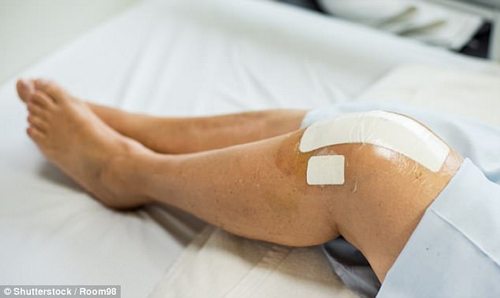Oxford University orthopaedics researchers say about half of patients with worn out or damaged joints, typically aged between 60 to 80, could be suitable for a partial replacement, which often results in more natural movement and allows people to be more active.
Partial knee replacements could be better for patients and save the NHS money if their use became widespread.
Almost 100,000 knee replacements are carried out each year in the UK, excluding Scotland. But fewer than one in ten have a partial or ‘half’ knee replacement on only one side of the joint, a study found.
The procedure is less invasive, allows for a faster recovery and carries fewer post-operative risks, the findings show.
Almost 100,000 knee replacements are carried out each year in the UK, excluding Scotland

It is also a cheaper intervention for the NHS, in both the short and long-term.
Professor David Murray, co-lead researcher, said: ‘This is an important finding. If surgeons aim to use partial knees in a quarter or more of their knee replacements, this will substantially improve the results of knee replacement and will save money.’
The knee is the largest joint in the body and is made up of four bones. The typical replacement substitutes the lower end of the thigh bone and the top of the shinbone with metal or plastic implants.
The Oxford University research, published in BMJ Open, analysed data from the National Joint Registry and found the success of partial replacements increased in line with how often the surgeon used them.

NHS England said partial replacements were ‘not suitable for all patients’, adding: ‘Doctors should decide the best course of treatment in the best interest of the patient and not the cost implications.’
Oxford University orthopaedics researchers say about half of patients with worn out or damaged joints, typically aged between 60 to 80, could be suitable for a partial replacement



